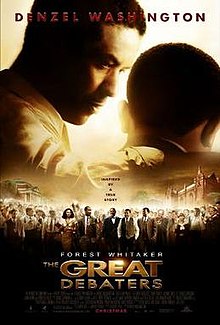The Great Debaters
| The Great Debaters | |
|---|---|

Theatrical release poster
|
|
| Directed by | Denzel Washington |
| Produced by |
|
| Written by |
|
| Starring |
|
| Music by |
|
| Cinematography | Philippe Rousselot |
| Edited by | Hughes Winborne |
|
Production
company |
|
| Distributed by |
The Weinstein Company (Metro-Goldwyn-Mayer) |
|
Release date
|
|
|
Running time
|
126 minutes |
| Country | United States |
| Language | English |
| Box office | $30.2 million |
The Great Debaters is a 2007 American biographical drama film directed by and starring Denzel Washington. It is based on an article written about the Wiley College debate team by Tony Scherman for the spring 1997 issue of American Legacy.
The film co-stars Forest Whitaker, Kimberly Elise, Nate Parker, Gina Ravera, Jermaine Williams and Jurnee Smollett. The screenplay was written by Robert Eisele. The film was released in theaters on December 25, 2007.
Based on a true story, the plot revolves around the efforts of debate coach Melvin B. Tolson (Denzel Washington) at a Historically Black College Wiley College to place his team on equal footing with whites in the American South during the 1930s, when Jim Crow laws were common and lynch mobs were a pervasive fear for blacks. In the movie, the Wiley team eventually succeeds to the point where they are able to debate Harvard University. This was their 47th annual debate team.
The movie also explores the social constructs in Texas during the Great Depression including not only the day-to-day insults and slights African Americans endured, but also a lynching. Also depicted is James L. Farmer, Jr. (Denzel Whitaker), who, at 14 years old, was on Wiley's debate team after completing high school (and who later went on to co-found C.O.R.E., the Congress of Racial Equality). According to the Houston Chronicle, another character depicted on the team, Samantha Booke, is based on the real individual Henrietta Bell Wells, the only female member of the 1930 debate team from Wiley College who participated in the first collegiate interracial debate in the United States. Wells also happened to be a minor African American poet whose papers are housed at the Library of Congress.
...
Wikipedia
